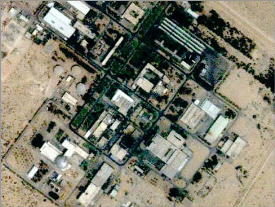The Zionist entity expresses serious concerns about the Iranian nuclear file.
The Zionist entity expressed serious concerns about the Iranian nuclear file, where a senior military official said Tuesday that “a nuclear-armed Iran could deter the Zionist entity from going to war against Lebanon and the Gaza Strip.”
Major-General Amir Eshel, head of strategic planning for the Zionist armed forces, echoed ‘Israeli’ government leaders who argue that Iran could create a "global nuclear jungle" and fuel arms races in “an already volatile Middle East,” ‘Israeli’ daily Haaretz reported Tuesday.
Eshel made clear that Zionist entity - widely reputed to have the region's only atomic arsenal - worries that Syria and Lebanon's Hezbollah mujahedeen, as well as Palestinian Hamas movement who rule Gaza could one day find reassurance in an Iranian bomb.
"They will dare to do things that right now they would not dare to do," he said in a briefing to foreign journalists and diplomats.
 He highlighted as well that this is going to create a dramatic change in the entity’s strategic posture, because if it is forced to do things in Gaza or Lebanon under an Iranian nuclear umbrella, it might be different regarding to repercussions.
He highlighted as well that this is going to create a dramatic change in the entity’s strategic posture, because if it is forced to do things in Gaza or Lebanon under an Iranian nuclear umbrella, it might be different regarding to repercussions.
"When the other side has a nuclear capability and is willing to use it, you think twice," Eshel was quoted as saying. "You are more restrained because you don't want to get into that ball game," he added.
Eshel expressed fears of getting involved in future war in the region, saying “there are now some 100,000 rockets and missiles that could be fired at Israel by the guerrillas, Iran and its ally Syria.”
 “Despite seeing its resources strained by a 10-month-old unrest, Syria's government has invested e2 billion in air defenses over the last two years, and more on counter-measures against any ground invasion,” Eshel said, linking both efforts to Syrian wariness of Israel.
“Despite seeing its resources strained by a 10-month-old unrest, Syria's government has invested e2 billion in air defenses over the last two years, and more on counter-measures against any ground invasion,” Eshel said, linking both efforts to Syrian wariness of Israel.
However, the Zionist official declined to be drawn on whether the occupation entity might try to attack Iran's distant, dispersed and well-defended nuclear facilities alone - or, conversely, whether it could decide to accept a nuclear-armed Iran as “an inevitability” to be contained through fortifications.
Those decisions, Eshel said, were up to the government and the armed forces would provide it with a "tool box" of options.